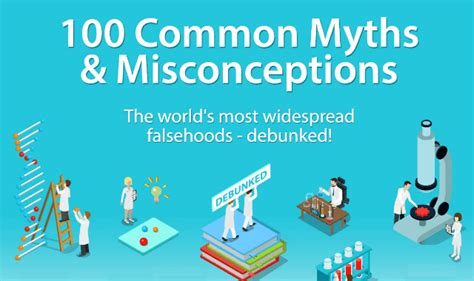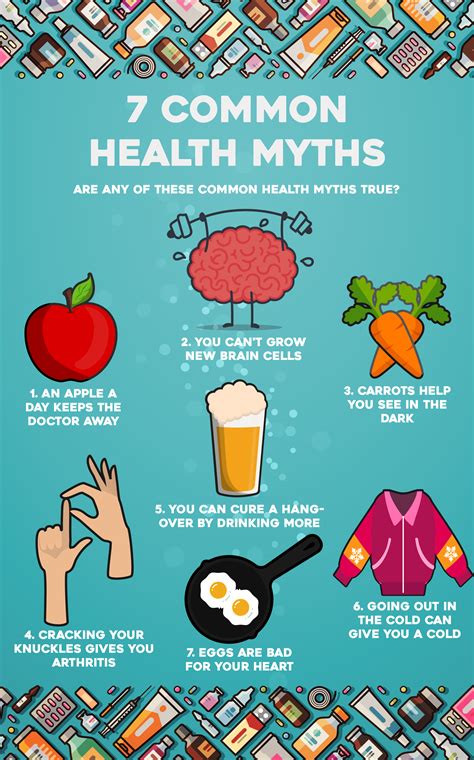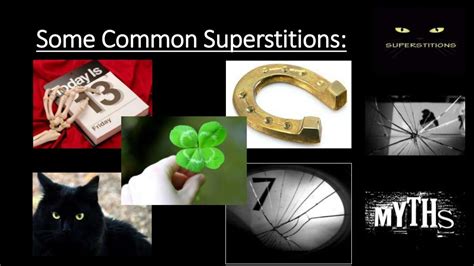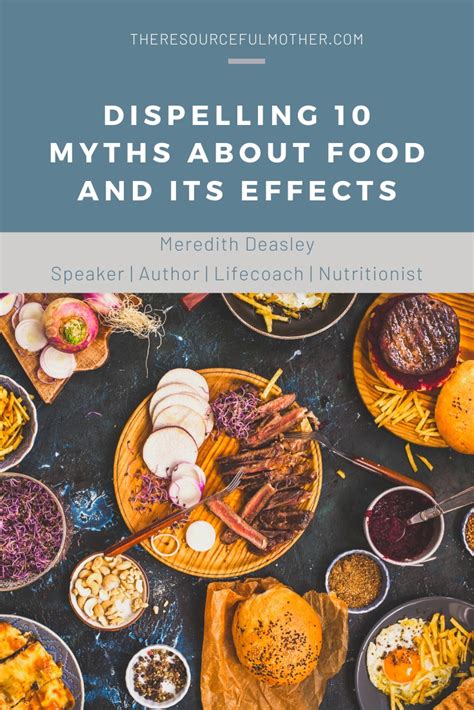Breaking News


Popular News


Discover the truth behind common health myths, superstitions, urban legends, old wives’ tales, and food and nutrition misconceptions in this science-based blog post.Have you ever wondered about the truth behind common myths and misconceptions? From old wives’ tales to urban legends, there are countless beliefs that have been passed down through generations. In this blog post, we will delve into the science behind popular myths and explore the facts that dispel these age-old misconceptions.
From debunking common health myths to uncovering the real story behind superstitions and urban legends, we will examine the evidence that separates fact from fiction. Additionally, we will take a closer look at the science of old wives’ tales and dispel myths about food and nutrition. By exploring the truth behind these myths, we can gain a better understanding of the world around us and make more informed decisions about our health and well-being. So, let’s embark on a journey to separate truth from fiction and uncover the scientific explanations behind the myths and misconceptions that have captured our imagination for generations.
Contents

When it comes to health, there are countless myths and misconceptions that can lead to confusion and potentially harmful decisions. One common myth is that cracking your knuckles will lead to arthritis. In reality, the sound is caused by gas bubbles in the synovial fluid within the joint, and studies have shown no link between knuckle cracking and arthritis. Another prevalent myth is that starving yourself is an effective way to lose weight. In fact, skipping meals can slow down your metabolism and lead to nutritional deficiencies.
Furthermore, there is a false belief that detox diets and cleanses are necessary to rid the body of toxins. The truth is that the body has its own detoxification system, primarily involving the liver and kidneys, and there is little scientific evidence to support the effectiveness of detox diets. Additionally, the notion that diabetes is caused by consumption of sugar is a misconception. While sugar intake can contribute to weight gain and obesity, it does not directly cause diabetes.
In conclusion, it is important to educate ourselves and rely on evidence-based information when it comes to health myths. By debunking these common misconceptions, we can make more informed decisions and prioritize our well-being.

Superstitions have been around for centuries, with people believing in everything from black cats crossing your path to avoiding walking under ladders. But what is the science behind these popular beliefs? Let’s dive into some of the most common superstitions and explore the truth behind them.
One of the most well-known superstitions is that breaking a mirror will bring you seven years of bad luck. This belief dates back to ancient times when mirrors were rare and expensive, so breaking one was a serious matter. However, there is no scientific evidence to support the idea that breaking a mirror will bring you bad luck. It’s simply a superstition passed down through generations.
Another common superstition is the belief that Friday the 13th is an unlucky day. This fear of the number 13, known as triskaidekaphobia, has been around for centuries and has even influenced architecture and design (with many buildings skipping the 13th floor). But again, there is no scientific basis for the fear of Friday the 13th being an unlucky day. It’s simply a superstition that has persisted over time.
Superstitions are often based on cultural beliefs and traditions, and while they may not have any scientific basis, they can still have a powerful influence on people’s behavior. Whether it’s avoiding walking under a ladder or carrying a lucky charm, superstitions are a fascinating part of human culture and psychology.

Urban legends have captivated and intrigued people for generations, often spreading through word of mouth and evolving over time to become larger than life. These tales are often so compelling that they have become deeply ingrained in popular culture, despite lacking any substantial evidence to support their claims. However, by examining these stories through the lens of science and critical thinking, we can uncover the truth behind these urban legends and separate fact from fiction.
One prevalent urban legend is the idea that swallowing gum will stay in your stomach for seven years. This myth has been widely perpetuated, causing many people to fear the consequences of accidentally swallowing their gum. However, the science behind this urban legend reveals that while gum cannot be digested, it does not actually stay in your stomach for an extended period of time. In reality, gum passes through the digestive system like any other food and is eventually eliminated from the body.
Another common urban legend involves the infamous dead body under the hotel mattress story, in which unsuspecting hotel guests allegedly discover a foul odor coming from their mattress, only to find a decomposing body hidden inside. While this story has been sensationalized in countless movies and television shows, there is no documented evidence to support its widespread occurrence. In fact, this urban legend has been thoroughly debunked, with no verifiable cases of such an event actually happening.
By examining these urban legends through a logical and analytical lens, we can dispel the myths and misconceptions that have persisted for so long. It’s important to approach these stories with a healthy sense of skepticism and seek out credible sources to separate fact from fiction. By doing so, we can gain a deeper understanding of the world around us and prevent the perpetuation of false information.

Old wives’ tales have been passed down through generations, often serving as cautionary tales or folk remedies. Many of these tales have become ingrained in popular culture, but what is the science behind them? Let’s take a closer look at some common old wives’ tales and explore the truth behind them.
One popular old wives’ tale is that eating carrots will improve your vision. While it’s true that carrots are rich in vitamin A, which is important for eye health, they won’t magically give you superhuman vision. In reality, a well-balanced diet that includes a variety of fruits and vegetables is essential for maintaining good eyesight.
Another common belief is that cracking your knuckles will lead to arthritis. Despite what you may have been told as a child, there is no scientific evidence to support this claim. The sound you hear when cracking your knuckles is simply the release of gas from the synovial fluid in your joints, and it does not cause arthritis.
One more old wives’ tale is the idea that going outside with wet hair will make you sick. While it’s important to stay warm in cold weather to avoid catching a cold, the temperature alone does not cause illness. Viruses and bacteria are the culprits behind getting sick, not a damp head.
| Old Wives’ Tale | Science |
|---|---|
| Eating carrots improves vision | Carrots are rich in vitamin A, but won’t give you superhuman vision |
| Cracking knuckles causes arthritis | No scientific evidence to support this claim |
| Going outside with wet hair makes you sick | Temperature alone does not cause illness; viruses and bacteria are to blame |

Dispelling Myths About Food and Nutrition
Dispelling Myths About Food and Nutrition
There are so many misconceptions around the topic of food and nutrition, often perpetuated by well-meaning family members, friends, and even the media. It’s important to separate fact from fiction and understand the science behind these popular myths.
One common myth is that eating fat will make you fat. In reality, not all fats are created equal. While trans fats and excessive saturated fats can contribute to weight gain and health issues, healthy fats such as those found in avocados, nuts, and fatty fish can actually be beneficial for weight management and overall health. It’s important to understand the role of different types of fats in the diet and make informed choices.
Another misconception is that skipping meals will help you lose weight. In truth, skipping meals can lead to overeating later in the day and a slower metabolism. It’s important to fuel your body with regular, balanced meals to support a healthy weight and optimal energy levels. Additionally, many believe that all carbs are bad, but the truth is that complex carbohydrates such as whole grains, fruits, and vegetables provide essential nutrients and fiber that are important for overall health.
| Common Myth | Truth |
|---|---|
| Eating fat will make you fat | Healthy fats can be beneficial for weight management |
| Skipping meals will help you lose weight | Regular, balanced meals support a healthy weight |
| All carbs are bad | Complex carbohydrates provide essential nutrients and fiber |
It’s important to educate ourselves and others about these myths surrounding food and nutrition. By understanding the science behind these misconceptions, we can make informed choices and prioritize our health and well-being.

Is it true that we only use 10% of our brain?
No, this is a popular myth. In reality, we use all parts of our brain, although not all at the same time.
Do carrots really improve eyesight?
Carrots do contain vitamin A, which is important for eye health, but eating more won’t significantly improve eyesight beyond normal levels.
Does cracking your knuckles cause arthritis?
No, multiple studies have shown that cracking your knuckles does not lead to arthritis. The sound is caused by gas bubbles in the synovial fluid within your joints.
Is it true that sugar makes kids hyperactive?
Despite the popular belief, numerous studies have found no direct link between sugar consumption and hyperactivity in children.
Can you really get a cold from being cold?
No, cold weather itself doesn’t cause a cold. Colds are caused by viruses, not by temperature.
Is it bad to wake a sleepwalker?
It’s a myth that waking a sleepwalker will harm them. In fact, it can prevent them from potential danger by guiding them back to bed.
Do hair and fingernails continue to grow after death?
No, once the body dies, the skin dehydrates and shrinks, creating the illusion of hair and nail growth.